| |
"The idea of creating his character was to have somebody who has been outside of society. An outsider who has been removed from the evolution of everything from technology to the music that people listen to, to how you talk to a girl, to what do you want with your life and how do you go about getting it." |
| |
|
A hugely experienced and award winning director said to me recently that Americans (as in Hollywood) just can't do sex on film. By 'sex' he didn't mean the mechanics of pornography. He was talking about the finer points of communication between two people in love (or not) engaged in the physical act. I offered the famous scene between Donald Sutherland and Julie Christie in Don't Look Now... Ah, but director Nick Roeg is English. Not letting the broad assertion go by with a pliant nod, I pulled up the tiger scene from Manhunter on You Tube (also directed by Michael Mann). If you don't know the movie (and you really should check it out and no playing the tiger scene out of context, please), the serial killer, Francis Dollarhyde, played by Tom Noonan has met a blind girl at work, Reba, convincingly and warmly played by Joan Allen. He takes her to a vet (animal, not Vietnam) where a prone tiger lies sedated waiting to have a tooth capped. She reaches out and her exploring hands go down on soft fur and push through all the way to the massive head, fangs and jaws. Leaning against the wall, Noonan watches in a physical delirium. She feels the hot breath of the tiger on her arm...
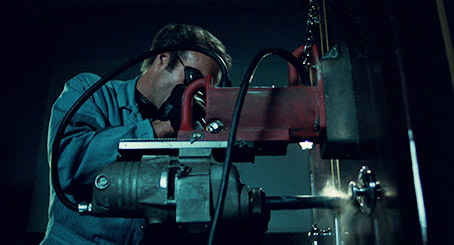
As visual and sensual metaphors for sex go, this is one of the finest I've seen in a mainstream movie. It's both dangerous and tender, not to mention adventurous, surprising and almost bursting at the seams with eroticism. And it is beautifully played, directed and acted. Let's also credit Mann's choice of music for ratcheting up the scene's sultry and seductive power – Coelcanth by Shriekback. If you want to burrow down further into metaphor land (albeit in a more playful but ultimately silly way), you could interpret Thief's opening scene as overtly sexual. James Caan is using his power tool (calm down) to drill into a safe. Once the hole is made, he flips the important part inside the safe (ooer), the door of which then yields to him. OK, fatuous perhaps but remember Caan's most famous role at that time was still Sonny Corleone, the well-endowed but hotheaded sibling of the calmer Michael from The Godfather. Caan is an overtly physical actor whose bearing is that of a machismo-drenched coiled spring. There's suppressed violence behind those eyes and the smile, on the odd occasion it appears, doesn't exactly promise an appropriately warm and reassuringly loving emotion to go with it. Let's leave the safe sex behind and get to the plot.
Caan plays hardened ex-con Frank (even the subtext of his name gives you a clue to his character – open, honest, direct, - and yes, I do know he's a thief). He is very picky about his jobs, is completely independent and runs a used car business and a bar as legitimate business fronts. He has a small team that takes care of the technical aspects of getting around security systems (including Jim Belushi as Barry whose physical mannerisms are the spit of his late brother's) and friends who custom build equipment to get him through safe doors. He only goes after diamonds and cash and despite his apparent material success, he yearns for a life of fatherhood and simple domesticity, something illustrated by a touching collage he carries around in his wallet. His father figure (Country and Western singing star, Willie Nelson in a terrific and surprisingly moving supporting role) is still inside but with a dodgy heart yearning not to die behind bars. He advises Caan to confess to his girlfriend, so that their relationship isn't built on a lie. Now, being the early 80s, the film is rife with one-liners and behaviour that no one would get away with today. Even the simplest remark "I'll pick you up at eight," could be taken as a sexist slight ("I'm the guy, I do the driving..."). Caan roughly forces his girlfriend (Tuesday Weld on fine form as Jessie) into his car after being late for a date in order to explain to her what he is and what he wants. It was nice to spot William Peterson with an added middle 'L' in the credits (Will Graham in Manhunter) in a small part trying to dial down Caan's temper.
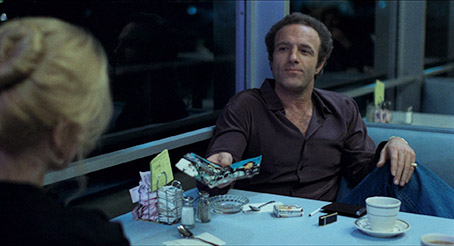
The scene of Caan confessing all, including how to survive prison (where he languished for a decade) is the actor's favourite of his career and the man has good judgement. It's a powerhouse piece of acting from an actor unused to exposing vulnerability. Weld matches him beat for beat. Her eventual tear is well earned. It's a testament to the director's craft that a film, in a genre that places action and violence front and centre, has the nerve to unpeel its anti-hero in such an emotional way. Ultimately, Caan, of course, cannot have what he wants no matter what powers are allied with him. It would be like a mass murderer on the run hoping and praying that the global police force would simply disappear instead of the reality of plain clothes police dogging his every move. Another nice irony of casting is that the corrupt cop Urizzi (John Santucci) was a thief himself and served as one of the movie's technical advisors. Frank is on a road on which there are no laybys or exits... His sacrifices are those of a man who has learned all of life's most vicious lessons in prison. One of my friends is a prosecutor who daily crashes into human horror and misery. It's very hard not to get a warped opinion (or honest depending on your own point of view) of the ugliness of human depravity. Caan's Frank has emerged from the crucible of incarceration and the only thing that matters to him is his code. Nothing but that code is sacrosanct. When Frank draws a line, you only cross it if you have a particularly well-developed and ambitious death wish.
Thief is, believe it or not, a staunchly moral film. Frank lives (and presumably is prepared to die) by a strict ethical conviction. Yes, he's a thief who steals but he employs no violence on his jobs and the places he steals from are (presumably) insured up to the hilt. He's a master craftsman (tricks learned from his father figure languishing in prison). He does and says what's right on his own terms (he's inexperienced, something that sometimes communicates itself as foolhardiness) and it's hard not to be sympathetic towards him but the movie's trajectory is written in its DNA. Frank's main fence for the stolen goods has taken a little off the top for himself and pays the ultimate price by being thrown from a high storey window. Frank wants his recently handed over money back, money that would have been in the dead man's pocket. He finds that organised crime is behind the murder and is offered a criminal contract with the boss, Leo played with suitably overbearing menace and faux paternal concern by Robert Prosky. Frank only wants one last lucrative job (shades of Ray Winstone in Sexy Beast) but Leo thinks he owns Frank after making certain things possible for him. You can see where this might be heading...
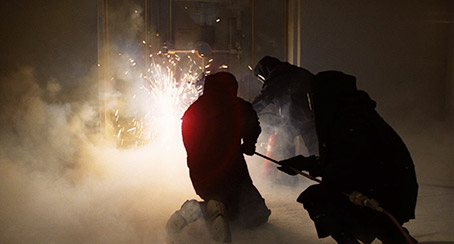
The movie is packed with what would become trademarks of Michael Mann's directorial toolbox even though Mann himself denies employing a personal style. There is a scene early on which to the execs may have seemed superfluous but is, of course, hugely revealing. The morning after the first heist, Caan sits next to a fisherman on a Chicago wharf. He offers the man breakfast, which is enthusiastically and thankfully received. The reverse of the pair in silhouette with the ocean stretching out in front of them is a stark cousin (and not too distant a cousin) of the shot of Will Graham and Jack Crawford (Dennis Farina) on the beach in Manhunter (Farina's first role for Mann was as a hired machine gun-wielding goon in Thief, wonderfully ironic given Farina's past career as a Chicago police officer). The colour palette is rigorously controlled with some stark neon reflections on car hoods, signatures of a director with a tight grip on his material and who's artistically aware of the emotional effects of colour and light. There are long and loving shots of the detail of safe cracking (a nod to Jules Dassin's Rififi perhaps) including a cascade of sparks that to any cineaste is a nod to Psycho's showerhead water torrent. Once a major heist is finished, Mann treats us to Frank and Jessie (and recently illegally acquired baby David) on a beach dressed in white (compare with Kim Greist's wardrobe in Manhunter), a symbol of the apparent shackles falling but as there was a significant percentage of the movie yet to play out, you sort of understand the 'white' times of frolicking in the surf are but a blip in the violent life of a seasoned criminal. There is a masterful shot (one that these days may have been digitally obtained) of the corrupt police tailing Frank's car but the electronic tracer has been planted on a bus headed way out of town. Mann does not present us with this information. We glean it from the mastery of the shot itself. That is, in my humble opinion (for those weaned on brevity, IMHO) cinema assuming intelligence in its audience. God, do you know how rare that is these days?
However, there is one aspect of the movie, quite a key one as it happens, that frequently slaps Thief across the face. It doesn't surprise me that the score written by Tangerine Dream got nominated in 1982 for a Razzie, celebrating that year's worst of Hollywood. But again, context is all. It may have sounded new and exciting to Mann at the time but the passing of time has not been kind. That 'sit on a synthesizer' score style has infected even the best film composers (Maurice Jarre's Mosquito Coast comes to mind). Yes, it's a product of its time but in Manhunter there's a similar style but it's infrequently used and gives way for the wonderful music cues that are dotted around the film informing and poisoning the minds of the characters. In Thief, the music is bludgeoning, insistent and emotionally one note unless it's a scene of violence and then it just gets louder. There is, of course, a strong chance that I simply didn't 'get' what Mann was doing by employing such a score and I'm happy to be proved wrong but I can only react to what's in front of me, not that and a statement of intent from the composers and directors.
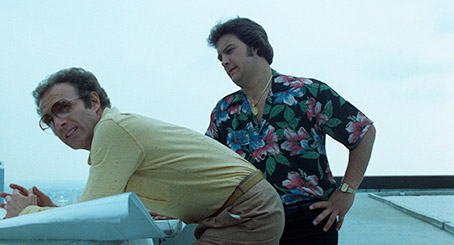
Thief is a wonderful example of what cinema was blossoming into from the early 70s onwards; works from iconoclastic filmmakers with distinctive voices who had lived real lives from which to draw their characters and drama rather than those filmmakers who followed who seemed to have learned life lessons from a movie screen. I'm not having a go at those directors. I'm also someone whose life lessons have been gleaned from less than authentic sources but Michael Mann, given his impressive oeuvre (someone get The Keep out on Blu-ray!) is the real deal; an adult filmmaker with technique to spare and a remarkably distinct point of view. In conclusion, one small thing which has been gnawing at me and worrying me for a little while. I am now completely convinced that the public persona of a BBC media naughty boy has been stolen wholesale from Caan's character in Thief. I know the association may not be a palatable one (and I'm sure James Caan would be appalled) but it's my conclusion that Top Gear's Jeremy Clarkson has stolen his entire shtick from Caan's Frank... Please tell me I'm wrong. Thief is a terrific crime drama, superbly directed, with an emphasis on character and features James Caan's best work. It'll sit proudly in anyone's Blu-ray collection.
Included in this package are two cuts of the film on separate discs to maximise the bitrate and picture quality on both – the original Theatrical Cut and the Director's Cut prepared for the Criterion release. The differences are surprisingly small for the most part, and the running times differ by a mere 1 minute and 26 seconds, though interestingly the Director's Cut is the shorter of the two. I'm not going to get into listing all of the differences here, in part because I've not seen both often enough to identify them all, but will comment on one that hit me immediately, one of the very scenes that Camus discusses above, the one in which Frank sits down next to a fisherman on a Chicago wharf on the morning after the opening robbery. In the Theatrical Cut it's simply not there, and it would thus seem that my fellow reviewer was right about the execs regarding the scene as superfluous. Having appreciated its inclusion in the Director's Cut, its absence from the Theatrical Cut is sorely felt.
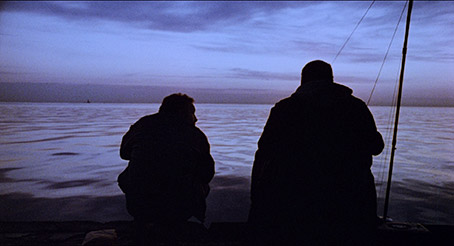
One element from the original theatrical release that was altered for video and remains that way here comes late in the film when Leo is lecturing a beaten Frank and tells him, "People will be eating them for lunch tomorrow in their Wimpy burgers and not know it." Originally the line was apparently "People will be eating them for lunch tomorrow in their McDonald's hamburgers and not know it." We can presume that Wimpy were somewhat less litigious than McDonald's, although the line has changed again in the Director's Cut to remove any trace of an incriminating brand name.
Two things struck me immediately about the transfer here, which was sourced from the same 4K restoration at the US Criterion release. The first is that the image doesn't initially feel as razor sharp as crispest of modern Hollywood features. I can't say I'm surprised. Thief was shot on film in the early 1980s and includes scenes set in dimly lit interiors and on the streets at night that have been shot under available light, a challenge for even the most sensitive film stocks of the day. This results in a visible level of grain and has forced a sometimes narrow depth of field that occasionally pushes characters or detail slightly out of focus. How much of this is a deliberate decision on Mann's part is a tough one to call – certainly the shot where Leo leans down towards the camera to berate Frank in a later scene and drifts out of focus feels like a conscious move. But when the conditions are favourable the level of detail is still really impressive, and a substantial upgrade on the previous MGM DVD edition.
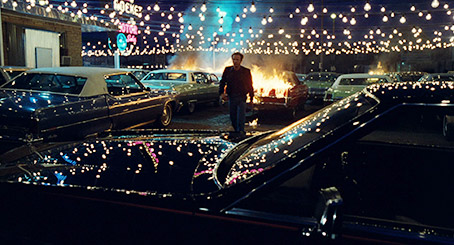
The second thing that hit me was the strength of the contrast, which delivers some of the inkiest black levels I've seen in some time, but gives no quarter to shadow detail. Again, this may well have been part of the visual design from the early stages – the restoration was produced in collaboration with Michael Mann, and he thus clearly believes this is how the film should look. Just occasionally I did suspect that detail that was probably visible in the cinema (it's been a long time since I saw it on the big screen, when it was somewhat misleadingly retitled Violent Streets) had been lost in the dark, but for the most part it feels absolutely right for the story being told, and makes the night seem as much a character in the film as Frank or Barry or the neon and street lights that seem to reflect off every metallic surface.
The colours are largely naturalistic in the daylight, but elsewhere there's a cool hue to many scenes. At least there is on the Director's Cut. Although the level of detail appears to be virtually identical on both transfers, there's a warmer hue to the colour palette on the Theatrical Cut that I rather liked, and just occasionally the contrast felt a tad more generous on darker detail. More surprising is that many of the shots are framed wider on the Director's Cut than on the Theatrical Cut, including more of the image on two, three or all four sides of the frame. Both prints are spotless and free of damage, and the brighter neon colours are seductively rendered.
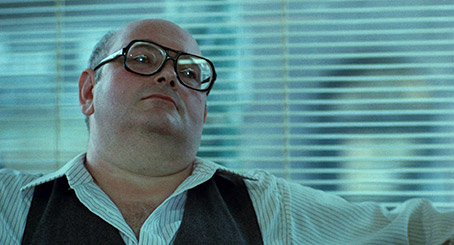
The same shot from the Director's Cut (above) and the Theatrical Cut (below)
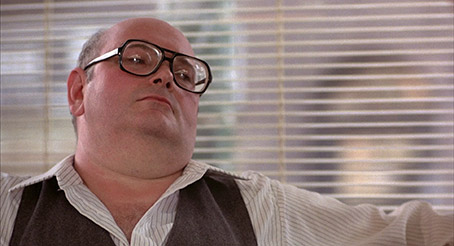
When it comes to soundtracks, the Director's Cut offers you the choice between Linear PCM 2.0 stereo and DTS-HD Master Audio 5.1 surround, and to be honest there's not a huge difference between them. Sonically they are almost identical, boasting a decent dynamic range, clear dialogue rendition and a lively reproduction of the effects and score. There is some clear stereo separation on both tracks, but the music is more widely spread on the 5.1 track.
The only audio option on the Theatrical Cut is Linear PCM 2.0 stereo, which while perfectly serviceable is not quite as crisp and bright as the restored track on the Director's Cut.
Also included on the Theatrical Cut is an isolated music and effects track, which if you don't like the score will be a bit of a nightmare. Unlike my good friend and fellow reviewer here, however, I'm an enthusiast for the Tangerine Dream score, though can fully appreciate where Camus is coming from in his complaints above. For me, though, it's a crucial component of the fabric of the film, a sonic expression of the neon soaked streets and the technologically driven nature of the robberies, and an externalisation of the adrenaline charge that taking down a seemingly impenetrable vault doubtless delivers. The pulsing electronics of music track are a key part of what makes the opening heist so damned exhilarating – I genuinely believe it would be nowhere near as effective with a more conventional score or even played out in silence, and for me it feels as perfectly married to the visuals as the electronic wails and crashes of Vangelis that accompanies the introduction to Los Angeles, 2019 in the opening of Blade Runner. But that's just me, and I'm fully aware that the score will likely annoy as many people as it seduces – I'm just personally delighted to hear it sounding as good as it does on the Director's Cut here.
Optional English subtitles for the deaf and hearing impaired are also included on the Director's Cut.
Audio Commentary
Intriguingly, there are no announcements on the disc or the commentary itself to clarify who the participants are (or when the track was recorded), but it won't take you long to work out who's on board. In what is likely a port of the commentary on the Criterion release (I don't own thay disc so can't say for sure), director Michael Mann and leading man James Caan look back at the experience of making the film and provide some fascinating analysis of Frank's character and motivation. The two are clearly friends and there is some good-natured piss-taking in the early stages ("How d'you do that Mike?" Caan asks early on, "Make it look like it was raining?"), but there is plenty here worth hearing, not least the revelation that the tools and the safes used in the film were all for real, as were the techniques used to break into them. Caan himself trained with some of Chicago's most experienced thieves, who also acted as technical advisers on the film (a term that amuses the hell out of Caan), as were some of the detectives who pursued them. Mann cast a number from both parties in the film (ex-detective Dennis Farina included) and played games with expectations by having them play their opposite numbers, thieves playing cops and vice versa – the cop who harasses Frank in his car is played by John Santucci, the thief on whom Frank was directly based. Caan confirms that his café conversation with Tuesday Weld is the scene he is the most proud of in his film acting career, and Chicago-born Mann intriguingly suggests that in this particular city corruption was "populist and democratic", whereas in other cities "you can't buy anything unless you were a big petroleum company." It is worth noting that there are some sizeable dead spots here, and that the commentary is only active for about two-thirds of the film and maybe even less, but when it does kick in it's always worth hearing.
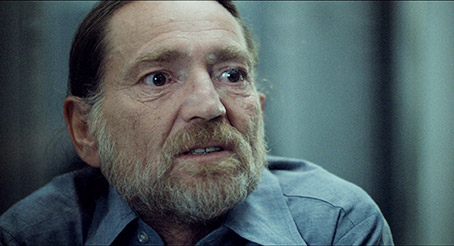
The Directors: Michael Mann (59:28)
A 2001 episode from the TV series The Directors, whose heroic theme music and slightly tacky CG titles front a solid enough trip through Mann's film career. Several of the actors he has worked with are interviewed and all of them have seriously positive things to say about him. His early life and career are briefly covered (I was unaware that he was a graduate of the London Film School), and all of his key features up to and including The Insider are covered in interesting detail. Well, all except one. As a huge fan of The Keep, I was a little pissed off to see it given no coverage and dismissed in a matter of seconds as "a film that didn't do well with critics or with audiences."
Stolen Dreams (14:32)
A newly filmed interview with the affable James Caan, who at one point good-naturedly describes Michael Mann as "a little Napoleonic dick" but reaffirms that Thief remains – from an acting viewpoint especially – his favourite of his own films (he also believes it to be Mann's finest film). Many of the things covered in the commentary are repeated here, but there are a fair few comments unique to this extra, and there's an amusing moment towards the end when he reflects on his breakthrough role in The Godfather: "If I knew they were doing Godfather II there was no way Francis would have shot me in that one. I would have made money, for Christ's sake!"
Hollywood USA: James Caan (24:38)
An offbeat and rather engaging episode of the French TV series Ciné regards that appears to have caught Caan on holiday with his family, and divides its time between chats about his personal life and career and shots of him playing golf and squash and fishing with his son. Particularly interesting is his recollection of working for Howard Hawks on El Dorado and the friendship he struck up with John Wayne – hard though it may be to imagine, the pair spent much of the film playing jokes on each other.
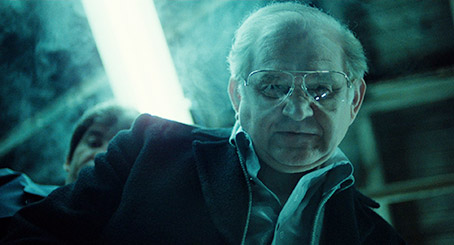
The Art of the Heist (66:29)
A new audio essay by author and critic F.X. Feeney that is divided chapters and runs under (occasionally relevant) extracts from the film. It's a knowledgeable and thoroughly researched piece (Feeney has interviewed Mann many times and worked with him on one project), and delivers plenty of useful information and analysis. Much of it was certainly new to me, from the news that a young Mann fresh out of film school shot footage of the 1968 Paris student rebellion, to the stories of the level of preparation he undertakes for seemingly every project he is involved in. Feeney draws thematic comparisons between Thief, Heat and Public Enemies, explores the specific qualities of each of Thief's leading players, deconstructs elements of Mann's directorial style, and reveals that Mann worked so closely with Tangerine Dream on the score that he would specify specific notes that the music should hit at certain points. There's loads more here, but that's for the erudite Mr. Feeney to elaborate on rather than me.
Theatrical Trailer (1:53)
A really well edited trailer whose potential spoilers are presented in a manner that they will only seem like spoilers if you've actually seen the film. The line "I am the last guy in the world that you want to fuck with" has here been cleaned up as "I am the last guy in the world that you want to mess with." Not quite as intimidating.
Booklet
The key component of this typically well produced booklet is a learned essay on the film by Brad Stevens, which is supported by details of the transfer, main credits for the film and some quality stills.
Although Mann's excellent 1979 TV Movie The Jericho Mile had a cinema release in Europe, in actuality Thief was Mann's theatrical feature debut, and as first films go it's a hell of an achievement. As F.X. Feeney says in his audio essay, the film is the work not of a gifted newcomer but a fully mature talent, thrilling in its action but shining brightest in its character scenes, aided no end by a belter of a cast, all of whom are on excellent form. Arrow's 2-disc Blu-ray does the film proud, including as it does strong restorations of both the Theatrical and the Director's Cut, and some excellent extra features. A superb release that comes highly recommended.
|